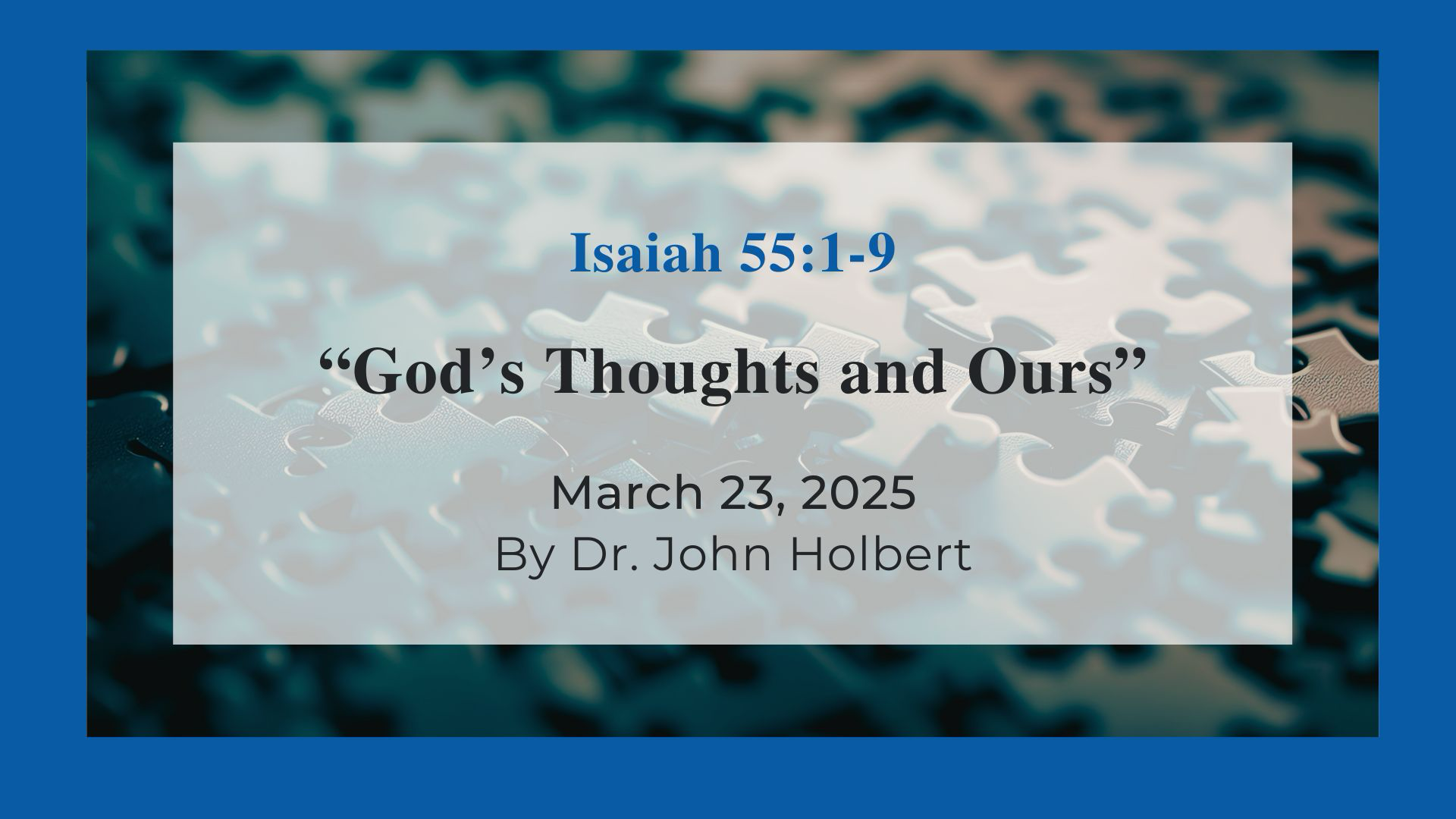God's Thoughts and Ours - Reflections on Isaiah 55:1-9, Lent 3, Year C
by John C. Holbert on Friday, February 7, 2025

The unknown figure we call 2-Isaiah, whose oracles begin in Is.40 and conclude in Is.55, not only writes with uncommon poetic skill—among the finest poets in our Bible—but also focuses attention on an immensely surprising and wonderfully welcome announcement for the Judean exiles in Babylon. The author begins with those famous lines “Comfort, comfort, my people,” (Is.40:1) spoken to a group of displaced persons, who have lived in the foreign capital for nearly two generations. This time frame indicates that many in the poet’s audience had never seen Judah and Jerusalem with their own eyes, only experiencing it through images conjured by the very oldest among them. These exiles could hardly expect much comfort from their Babylonian captors, for though they were not held in slavery, they were expected to adopt Babylonian culture if they were to continue to reside in the great city. Many no doubt did just that, though there surely were secret places in the city where Judeans gathered to sing the old songs of Zion, to remind one another of the great deeds of YHWH, to convince themselves that Babylon was not their final destiny.
And then in 539 BCE, Cyrus the Persian came to the city and claimed it for his empire, apparently with little or no bloodshed. In a few short months, the long-ascendant Babylonian empire—having existed in one guise or another for nearly 1500 years— disappeared into the Persian maw. Little wonder that Isaiah called Cyrus “messiah,” (Is.45:1), since he not only defeated the hated Babylonians, but also asked the captives in the city if they desired to return to their homelands, and even offered to help them do so! As 2-Isaiah concludes his prophecy, he shouts “For you shall go out in joy, and be led back (to Judah) in peace; the mountains and the hills will break out in singing and all the trees of the field will clap their hands!” (Is.55:12). His words first provide comfort and then offer joy in the return to Jerusalem.
Yet, just prior to that resplendent ending, the prophet gives important reflections on the YHWH who remains with them in their exile. I wish to focus on only one of those that I find particularly significant as we moderns attempt to include God in our lives in what now is a thoroughly secular society. “My plans are not your plans, nor are my paths your paths. For as the skies are far above the earth, just so are my paths higher than yours, and my plans higher than yours” (Is.55:8-9). I have translated the Hebrew “plans,” rather than the NRSV’s “thoughts” (though both are possible); Isaiah’s point here seems to be that YHWH’s designs, plans are far different than the ones imagined by the people of Judah. They had no notion of the importance of exile for their community, no inkling that YHWH had something in mind for them that they hardly could fathom. If they are to experience the sheer joy of return to Judah, it was crucial for them to live in exile the more fully to appreciate what YHWH had devised for them.
Furthermore, not every Judean accepted Cyrus’s offer to go home; many of the emerging Jews stayed in Babylon to form the core of a significant Jewish academic community that lasted some 1500 years and produced basic literature that informed and centered Judaism as it made its miraculous spread throughout the world. All that, Isaiah suggests, was also a design of YHWH, though of course 2-Isaiah saw none of that later history as it unfolded.
Isaiah’s conviction that YHWH’s plans and ways are far different from any human ones is mirrored in Paul’s famous Christ hymn in his letter to the Philippians: “May this mind (Greek nous) be in you as it was in Christ Jesus, who though he was in the form of God did not regard equality with God as a thing to be exploited but emptied himself, taking the form of a slave” (Phil.2:5-7). Paul, like Isaiah before him, imagined the design of God was far different, far higher, than the design of human beings. No human, he says, would ever willingly become a slave, but Jesus, as the agent of God, did precisely that, becoming “obedient to the point of death” (Phil. 2:8). Little wonder that Paul in another epistle called such actions “foolishness, anathema, garbage” to any rational human being. Yet, the apostle calls on all who would follow Jesus to take on this very mind that appears so ridiculous to those who cannot see God in such actions.
In our Lenten devotions, we are asked to recognize and celebrate that the design and way of God are plainly different than our own. That design and way are likewise mysterious, not at all easily grasped by those who want control over and pleasant ease in their own lives. But God bids us reach out for comfort and surprising joy despite our circumstances, despite our exiles, and strive for the mind of Christ, following him in service and struggle for the least of God’s people.
